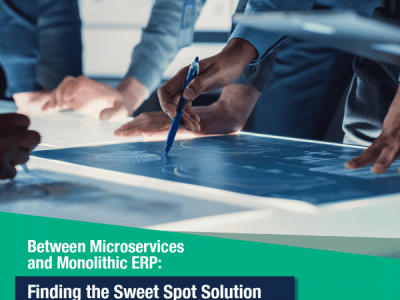
Should we be surprised when ERP resellers choose to partner with one of the big four Tier 1 ERP vendors, namely SAP, Oracle, Microsoft and Infor? After all, the Top 5 ERP vendors command just under a third of the market share, and promise reliable, broad, end-to-end functionality with lower upfront costs and a flexible subscription model.
For the reseller, partnering with an established ERP vendor is a relatively risk-free, lower-cost proposition – or at least one that does not require a huge capital investment or disruptive onboarding process. With most of the big players now offering vertical-specific software platforms to meet the needs of manufacturing, wholesale distribution, eCommerce and so on – and growing support for browser-based, mobile-ready platforms, it’s understandable that Tier 1 ERP appears to be the prudent choice for a reseller.
Despite the apparent comfort of partnering with Tier 1 vendors, however, as a competitive proposition, it stops resellers from unleashing their full potential – or even surviving in some cases. The upfront investment might be lower, but the long-term growth and services potential could be slower – or at worst non-existent.
With that in mind, here’s why resellers should be looking beyond the big ERP vendors to White Label ERP solutions for more fruitful partnership opportunities for their services business.
Standing on the Shoulders of Giants: The Benefits of Partnering with Big ERP
The flagship Tier 1 vendors offer robust core functionality that will meet most of the needs of each target vertical. The reseller then has the option of customizing core functionality through third-party add-ons (when supported) or using customization features in the application to adapt where possible via their services offering.
Partnering with Tier 1 vendors offers resellers a flexible, relatively low-cost route to entering the market, with the understanding that the core software has been fully tested and integrations of third-party apps should be relatively seamless.
How deep the reseller can penetrate into their target market depends on their own resources, however. The ERP vendor is focused on sales, not support or services, so the reseller will have to factor in the budget and resources to deliver, implement and support the new ERP solution among their customer base. It may also have to factor in longer lead times for any dev requests they cannot satisfy with their input to the ERP vendors product roadmap likely to be minimal unless they are one of the larger reseller partners. This can lead to customer frustration, workarounds or the addition of 3rd party bolt-ons – not ideal but often seen as a necessary evil in this space.
For many, the financial burden of marketing and supporting the partner ERP solution is worth it simply because it minimizes risk compared to building, testing, and launching an ERP solution from scratch.
That is, of course, if we assume (as many resellers do) that those are the only two options. A surprising number of resellers are unaware that there is a third option – partnering with a White Label ERP provider.
Why It Pays to Look Beyond the Tier 1 ERP Vendors
Bearing in mind that nearly 50% of companies are currently planning to acquire or upgrade their ERP system, it would be reasonable to expect that the market leaders in ERP have a seamless, reliable strategy in place for delivering success. Yet they do not. Over half of ERP implementations fail the first time around. The most common culprits are issues with data accuracy, user experience, and analytics. And who do you think the end-user will blame when the system says ‘No’?
The problem is that change management and implementation are not priorities for a vendor who is far more concerned with sales than support. The burden of ensuring a successful Go-Live and providing ongoing support falls to the reseller, as does understanding the finer nuances of what each platform must deliver for a specific customer.
Rarely is an ‘out-the-box’ ERP solution ready to meet the needs of a target vertical or individual company. According to a 2019 survey of distributors, in 10% of cases, minor customization is required, and in 37% of cases, significant customization is required. That’s because no two businesses are exactly alike, nor should they be. These differences often drive the company’s competitive advantage. The cost of customisation is a cost the reseller will have to assume, in terms of both time and money. Implementation times are around six months for a mid-size business, but 12 months or more for a larger enterprise.
The power dynamic between vendor and reseller is easy to overlook, too. Quite simply, some partners are more equal than others. A mid-size or market-leading reseller with a strong presence in their service sector might enjoy a certain amount of leverage with the vendor. A smaller reseller, on the other hand, might discover that they have limited influence when it comes to receiving a priority response for their support requests or input into the product roadmap. And with little control over the subscription models or roll-out timelines for new features and upgrades, resellers can soon find themselves disappointing their customers with increasing regularity.
There has to be a better way. And there is. But few resellers are even aware of it.
Introducing Better: White Label ERP
With a White Label ERP solution such as GenetiQ ERP, resellers can offer their customers a feature-rich, highly configurable platform that allows for seamless integration of third-party applications WITHOUT compromising core functionality.
If that sounds like a Tier 1 ERP solution, it’s no accident. The platform is designed to satisfy the various accounting, business intelligence, stock management, sales, and other common functions that customers require. But crucially, it’s NOT the same Tier 1 ERP solution that the competition is offering.
In terms of autonomy to add functionality, it’s far more agile and flexible than the big vendor solutions, many of whom are still struggling to keep pace with the rising demand for browser-based applications and mobile-access to KPIs or role-based ‘view and capture’ data. That’s a vulnerability no reseller can afford, not when global cloud app spending is set to top $200 billion by 2022 and cloud platform services will reach $70 billion.
With a White Label ERP solution, a reseller can recoup additional services revenue in catering to the specific nuances of each customer vertical or location, because the platform enables them to do so. The ROI on ongoing support and implementation is higher than simply reselling a software licence as the code-free customisation capabilities can be leveraged by the services team for the lifetime of the solution. What’s more if development is required many white label ERP providers adopt a boutique partner strategy with limited partners co-creating the development roadmap to ensure all partners have equal input; another significant advantage for resellers looking to differentiate and secure their business for the future.
Conclusion
The irony is that however eloquent the arguments on all sides for choosing an ERP partner, making a rational decision is a luxury that few resellers get to enjoy. Events and environmental changes typically dictate the next move, and it’s not uncommon for a reseller to suddenly realize that the customers themselves have already decided.
The time to weigh up the merits of an ERP platform is not when customers are already leaving in droves to a competitor. The reseller arguably knows better than anyone what the customers in their particular vertical or location want next, and if that functionality is not offered right now by the incumbent ERP solution, or due to launch as an upgrade in the immediate future, a White Label ERP solution may be the only viable solution.




